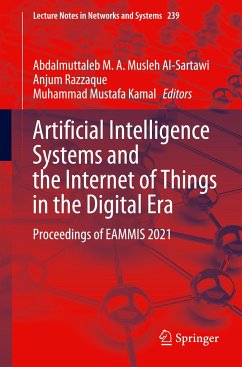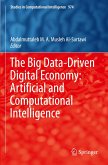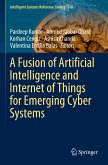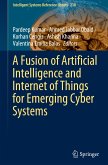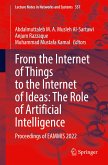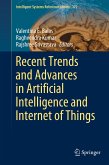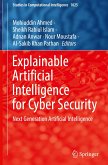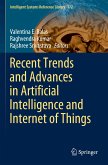Artificial Intelligence Systems and the Internet of Things in the Digital Era
Proceedings of EAMMIS 2021
Herausgegeben:Musleh Al-Sartawi, Abdalmuttaleb M.A; Razzaque, Anjum; Kamal, Muhammad Mustafa
Artificial Intelligence Systems and the Internet of Things in the Digital Era
Proceedings of EAMMIS 2021
Herausgegeben:Musleh Al-Sartawi, Abdalmuttaleb M.A; Razzaque, Anjum; Kamal, Muhammad Mustafa
- Broschiertes Buch
- Merkliste
- Auf die Merkliste
- Bewerten Bewerten
- Teilen
- Produkt teilen
- Produkterinnerung
- Produkterinnerung
This book brings together intelligence systems and the Internet of Things, with special attention given to the opportunities, challenges, for education, business growth, and economic progression of nations which will help societies (economists, financial managers, engineers, ICT specialists, digital managers, data managers, policymakers, regulators, researchers, academics, and students) to better understand, use, and control AI and IoT to develop future strategies and to achieve sustainability goals. EAMMIS 2021 was organized by the Bridges Foundation in cooperation with the Istanbul Medeniyet…mehr
Andere Kunden interessierten sich auch für
![The Big Data-Driven Digital Economy: Artificial and Computational Intelligence The Big Data-Driven Digital Economy: Artificial and Computational Intelligence]() The Big Data-Driven Digital Economy: Artificial and Computational Intelligence154,99 €
The Big Data-Driven Digital Economy: Artificial and Computational Intelligence154,99 €![A Fusion of Artificial Intelligence and Internet of Things for Emerging Cyber Systems A Fusion of Artificial Intelligence and Internet of Things for Emerging Cyber Systems]() A Fusion of Artificial Intelligence and Internet of Things for Emerging Cyber Systems154,99 €
A Fusion of Artificial Intelligence and Internet of Things for Emerging Cyber Systems154,99 €![A Fusion of Artificial Intelligence and Internet of Things for Emerging Cyber Systems A Fusion of Artificial Intelligence and Internet of Things for Emerging Cyber Systems]() A Fusion of Artificial Intelligence and Internet of Things for Emerging Cyber Systems154,99 €
A Fusion of Artificial Intelligence and Internet of Things for Emerging Cyber Systems154,99 €![From the Internet of Things to the Internet of Ideas: The Role of Artificial Intelligence From the Internet of Things to the Internet of Ideas: The Role of Artificial Intelligence]() From the Internet of Things to the Internet of Ideas: The Role of Artificial Intelligence169,99 €
From the Internet of Things to the Internet of Ideas: The Role of Artificial Intelligence169,99 €![Recent Trends and Advances in Artificial Intelligence and Internet of Things Recent Trends and Advances in Artificial Intelligence and Internet of Things]() Recent Trends and Advances in Artificial Intelligence and Internet of Things125,99 €
Recent Trends and Advances in Artificial Intelligence and Internet of Things125,99 €![Explainable Artificial Intelligence for Cyber Security Explainable Artificial Intelligence for Cyber Security]() Explainable Artificial Intelligence for Cyber Security171,19 €
Explainable Artificial Intelligence for Cyber Security171,19 €![Recent Trends and Advances in Artificial Intelligence and Internet of Things Recent Trends and Advances in Artificial Intelligence and Internet of Things]() Recent Trends and Advances in Artificial Intelligence and Internet of Things123,99 €
Recent Trends and Advances in Artificial Intelligence and Internet of Things123,99 €-
-
-
This book brings together intelligence systems and the Internet of Things, with special attention given to the opportunities, challenges, for education, business growth, and economic progression of nations which will help societies (economists, financial managers, engineers, ICT specialists, digital managers, data managers, policymakers, regulators, researchers, academics, and students) to better understand, use, and control AI and IoT to develop future strategies and to achieve sustainability goals. EAMMIS 2021 was organized by the Bridges Foundation in cooperation with the Istanbul Medeniyet University, Istanbul, Turkey, on March 19-20, 2021. EAMMIS 2021 theme was Artificial Intelligence Systems and the Internet of Things in the digital era. The papers presented at the conference provide a holistic view of AI education, MIS, cybersecurity, blockchain, Internet of Ideas (IoI), and knowledge management.
Produktdetails
- Produktdetails
- Lecture Notes in Networks and Systems 239
- Verlag: Springer / Springer International Publishing / Springer, Berlin
- Artikelnr. des Verlages: 978-3-030-77245-1
- 1st ed. 2021
- Seitenzahl: 556
- Erscheinungstermin: 29. Mai 2021
- Englisch
- Abmessung: 235mm x 155mm x 30mm
- Gewicht: 832g
- ISBN-13: 9783030772451
- ISBN-10: 3030772454
- Artikelnr.: 61623444
- Herstellerkennzeichnung Die Herstellerinformationen sind derzeit nicht verfügbar.
- Lecture Notes in Networks and Systems 239
- Verlag: Springer / Springer International Publishing / Springer, Berlin
- Artikelnr. des Verlages: 978-3-030-77245-1
- 1st ed. 2021
- Seitenzahl: 556
- Erscheinungstermin: 29. Mai 2021
- Englisch
- Abmessung: 235mm x 155mm x 30mm
- Gewicht: 832g
- ISBN-13: 9783030772451
- ISBN-10: 3030772454
- Artikelnr.: 61623444
- Herstellerkennzeichnung Die Herstellerinformationen sind derzeit nicht verfügbar.
Track 1: Innovation in the Digital Era.- Chapter 1 Model-based Validation of Business Processes: Case Study of Logistic Sector.- Chapter 2 COVID-19 Lung Image Classification based on Logistic Regression and Support Vector Machine.- Chapter 3 Performance Analysis of POX and RYU based on Dijkstra's Algorithm for Software Defined Networking.- Chapter 4 Priority Based Power Delivery System for Electric Vehicle Charging.- Chapter 5 Clustering Algorithms as a tool for Odour Classifications in E-nose Developments.- Chapter 6 Bidirectional Octonion Long-Short Term Memory Recurrent Neural Networks for Speech Recognition.- Chapter 7 E-Learning Acceptance during the Covid-19 Outbreak: A cross-sectional study.- Chapter 8 Digital Social Contracts with AI Robots: Some Implications for Amazon.com.- Chapter 9 Adaptations during COVID-19 and Smart Disease Detection through 'Germica'.- Chapter 10 Facebook advertising in the era of Digital Economy.- Chapter 11 Life-Saving APP: Snake Classification 'Venomous and Non-Venomous' using fast.ai based on Indian Species.- Chapter 12 Digital Media Usage among Arab Journalists during Covid-19 Outbreak.- Track 2: Industry 4.0 Management for Sustainable Technologies.- Chapter 13 Impact of E-Procurement on Supply Chain Performance.- Chapter 14 Predicting Pyramid Geometric Solar Water Still Plant Efficiency using RBF Based Multi-layer Perceptron.- Chapter 15 Comparative Analysis of Machine Learning Algorithms for Stock Market Prediction During Covid-19 Outbreak.- Chapter 16 Bitcoin Prediction using Ensemble Modelling.- Chapter 17 Structural Modeling of the Lean Supply Chain Enablers.- Chapter 18 Increasing productivity and quality with IoT technologies in industrial treatment systems.- Chapter 19 Intelligent Community Detection: Comparative Study (Covid19 Dataset).- Chapter 20 An Exploration into the Posture of Robo-Advisor Globally.- Chapter 21 A Review on Industry 4.0 Management for Sustainable Technologies.- Chapter 22 A Novel Hydro Renewable Power Platform: A Sustainable Innovation.- Track 3: Utilization of Blockchain, DLT, and Fintech for AI and IoT in the Digital eras.- Chapter 23 The Usage of Artificial Intelligence in New Media.- Chapter 24 Knowledge Management in Higher Education Institutions: Facts and Challenges.- Chapter 25 Artificial Intelligence and the Covid-19 Challenge.- Chapter 26 A Research for Computerized Maintenance Management System and Predictive Maintenance Investments in Turkish Industry.- Chapter 27 Artificial intelligence in personnel management: Opportunities and challenges to the Higher Education Sector (HES).- Chapter 28 Blockchain Technology for Reinforcing Sustainability Practices across Complex Multi-tier Supply Networks).- Chapter 29 Segmenting Potential Customers with Kohonen Network: A Bank-ing Sector Case Study.- Chapter 30 Applications of Artificial Intelligence in Covid-19 Pandemic.- Chapter 31 An Approach for Document Clustering using Semantic Similarity and Whale Optimization.- Chapter 32 OWLW: Ontology focused User Centric Architecture for Web Service Recommendation based on LSTM and Whale Optimization.- Chapter 33 KnowGen: A Knowledge Generation Approach for Tag Recommendation using Ontology and Honey Bee Algorithm.- Chapter 34 OntoReq: An Ontology Focused Collective Knowledge Approach for Requirement Traceability Modelling.- Chapter 35 KnowCrawler: AI Classification Cloud-driven Framework for Web Crawling using Collective Knowledge.- Chapter 36 Google's use of Artificial Intelligence in a two-sided advertising market causing trust loss, and data monopolization.- Chapter 37 Social Commerce: A Concept Explication.- Track 4: Role of Governance, Cybersecurity, and Privacy in AI and IoT.- Chapter 38 Financial Statements Fraud and Data Mining: A Review.- Chapter 39 The Impact of Balanced Scorecard on Firm Value: Evidence from Palestine.- Chapter 40 Corporate Governance and Sustainability of Financial Institutions: A Study of GCC Countries Banks.- Chapter 41 The Relationship between Human Resource Practices and Organizational Performance.- Chapter 42 Women Entrepreneurs (WE): Reshaping & Sustaining the Gulf Cooperation Council (GCC) Economy.- Chapter 43 The mediating role of employee engagement between quality of work-life and job performance in Jordanian commercial banks: conceptual paper.- Track 5: Fifth Industrial Revolution: The Internet of Ideas.- Chapter 44 A New Perspective on Decision Making and Coordination in Smart City Projects.- Chapter 45 Internet of Things and its impact on the future of education.- Chapter 46 Worldwide Artificial Intelligence Studies with a Comparative Perspective: How Ready is Turkey for This Revolution?.- Chapter 47 Technology readiness as an antecedent of technology acceptance model: A meta-analytic approach.- Chapter 48 E-Services and M-services using IoT: An assessment of the Kingdom of Bahrain.
Track 1: Innovation in the Digital Era.- Chapter 1 Model-based Validation of Business Processes: Case Study of Logistic Sector.- Chapter 2 COVID-19 Lung Image Classification based on Logistic Regression and Support Vector Machine.- Chapter 3 Performance Analysis of POX and RYU based on Dijkstra's Algorithm for Software Defined Networking.- Chapter 4 Priority Based Power Delivery System for Electric Vehicle Charging.- Chapter 5 Clustering Algorithms as a tool for Odour Classifications in E-nose Developments.- Chapter 6 Bidirectional Octonion Long-Short Term Memory Recurrent Neural Networks for Speech Recognition.- Chapter 7 E-Learning Acceptance during the Covid-19 Outbreak: A cross-sectional study.- Chapter 8 Digital Social Contracts with AI Robots: Some Implications for Amazon.com.- Chapter 9 Adaptations during COVID-19 and Smart Disease Detection through 'Germica'.- Chapter 10 Facebook advertising in the era of Digital Economy.- Chapter 11 Life-Saving APP: Snake Classification 'Venomous and Non-Venomous' using fast.ai based on Indian Species.- Chapter 12 Digital Media Usage among Arab Journalists during Covid-19 Outbreak.- Track 2: Industry 4.0 Management for Sustainable Technologies.- Chapter 13 Impact of E-Procurement on Supply Chain Performance.- Chapter 14 Predicting Pyramid Geometric Solar Water Still Plant Efficiency using RBF Based Multi-layer Perceptron.- Chapter 15 Comparative Analysis of Machine Learning Algorithms for Stock Market Prediction During Covid-19 Outbreak.- Chapter 16 Bitcoin Prediction using Ensemble Modelling.- Chapter 17 Structural Modeling of the Lean Supply Chain Enablers.- Chapter 18 Increasing productivity and quality with IoT technologies in industrial treatment systems.- Chapter 19 Intelligent Community Detection: Comparative Study (Covid19 Dataset).- Chapter 20 An Exploration into the Posture of Robo-Advisor Globally.- Chapter 21 A Review on Industry 4.0 Management for Sustainable Technologies.- Chapter 22 A Novel Hydro Renewable Power Platform: A Sustainable Innovation.- Track 3: Utilization of Blockchain, DLT, and Fintech for AI and IoT in the Digital eras.- Chapter 23 The Usage of Artificial Intelligence in New Media.- Chapter 24 Knowledge Management in Higher Education Institutions: Facts and Challenges.- Chapter 25 Artificial Intelligence and the Covid-19 Challenge.- Chapter 26 A Research for Computerized Maintenance Management System and Predictive Maintenance Investments in Turkish Industry.- Chapter 27 Artificial intelligence in personnel management: Opportunities and challenges to the Higher Education Sector (HES).- Chapter 28 Blockchain Technology for Reinforcing Sustainability Practices across Complex Multi-tier Supply Networks).- Chapter 29 Segmenting Potential Customers with Kohonen Network: A Bank-ing Sector Case Study.- Chapter 30 Applications of Artificial Intelligence in Covid-19 Pandemic.- Chapter 31 An Approach for Document Clustering using Semantic Similarity and Whale Optimization.- Chapter 32 OWLW: Ontology focused User Centric Architecture for Web Service Recommendation based on LSTM and Whale Optimization.- Chapter 33 KnowGen: A Knowledge Generation Approach for Tag Recommendation using Ontology and Honey Bee Algorithm.- Chapter 34 OntoReq: An Ontology Focused Collective Knowledge Approach for Requirement Traceability Modelling.- Chapter 35 KnowCrawler: AI Classification Cloud-driven Framework for Web Crawling using Collective Knowledge.- Chapter 36 Google's use of Artificial Intelligence in a two-sided advertising market causing trust loss, and data monopolization.- Chapter 37 Social Commerce: A Concept Explication.- Track 4: Role of Governance, Cybersecurity, and Privacy in AI and IoT.- Chapter 38 Financial Statements Fraud and Data Mining: A Review.- Chapter 39 The Impact of Balanced Scorecard on Firm Value: Evidence from Palestine.- Chapter 40 Corporate Governance and Sustainability of Financial Institutions: A Study of GCC Countries Banks.- Chapter 41 The Relationship between Human Resource Practices and Organizational Performance.- Chapter 42 Women Entrepreneurs (WE): Reshaping & Sustaining the Gulf Cooperation Council (GCC) Economy.- Chapter 43 The mediating role of employee engagement between quality of work-life and job performance in Jordanian commercial banks: conceptual paper.- Track 5: Fifth Industrial Revolution: The Internet of Ideas.- Chapter 44 A New Perspective on Decision Making and Coordination in Smart City Projects.- Chapter 45 Internet of Things and its impact on the future of education.- Chapter 46 Worldwide Artificial Intelligence Studies with a Comparative Perspective: How Ready is Turkey for This Revolution?.- Chapter 47 Technology readiness as an antecedent of technology acceptance model: A meta-analytic approach.- Chapter 48 E-Services and M-services using IoT: An assessment of the Kingdom of Bahrain.

